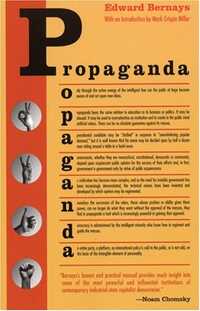
Propaganda
Chapter 8
Propaganda for Education
- Author :: Edward Bernays
- Publication Year :: 1928
- Posted: August 11, 2024
Important
Very important
Chapter 08 - Propaganda for Education
page 115:
-
EDUCATION is not securing its proper share of public interest. The public school system, materially and financially, is being adequately supported. There is marked eagerness for a college education, and a vague aspiration for culture, expressed in innumerable courses and lectures. The public is not cognizant of the real value of education, and does not realize that education as a social force is not receiving the kind of attention it has the right to expect in a democracy.
-
education does not attract the active interest of the public.
-
Some things never change.
page 116:
-
In a democracy an educator should, in addition to his academic duties, bear a definite and wholesome relation to the general public.
-
This sounds dangerously similar to “it takes a village” or “your children are not yours”.
-
In the field of education, we find what we have found in politics and other fields—that the evolution of the practitioner of the profession has not kept pace with the social evolution around him, and is out of gear with the instruments for the dissemination of ideas which modern society has developed. If this be true, then the training of the educators in this respect should begin in the normal schools, with the addition to their curricula of whatever is necessary to broaden their viewpoint.
-
The teachers certainly have a much broader viewpoint today. Beyond reading, writing, and arithmetic they teach activism and gender studies. They certainly don’t teach financial literacy. They certainly don’t teach civics.
-
The normal school should provide for the training of the educator to make him realize that his is a two-fold job: education as a teacher and education as a propagandist.
-
And there it is. I suspect Bernays is alluding to teachers being able to convince the public of their importance, but taken more literally our modern teachers are propagandizing their students to progressive ideologies. I wouldn’t want to see conservative ideologies pushed either. K-12 schools should barely even touch on these modern topics and stick to what is essential for day-to-day life in the republic. Higher education should allow all sides to make their cases in open debates. This is obviously not happening as of 2024.
-
Here I will add that “the long march through the institutions” I mentioned a few chapters ago is perfectly applicable. Progressive teachers get entry-level jobs. Over the next 30-40 years they spread their ideas to their students. Some of them move into administration and end up hiring more like-minded teachers. Within 1-2 generations the entire education edifice goes from left-leaning but open-minded to extreme-left and closed-minded.
page 117:
-
He himself (the teacher) is but moderately or poorly paid. Judging himself by the standards in common acceptance, he cannot but feel a sense of inferiority because he finds himself continually being compared, in the minds of his own pupils, with the successful business man and the successful leader in the outside world.
-
I think this adds fuel to the fire when it comes to “the long march…” You hear that teachers teach because it is their calling and that is what they love to do. Almost like a starving artist. While this may be true, it certainly would preclude anyone that values money from pursuing a job as a teacher. This leaves a fertile ground for teacher-activists. The “best” minds can earn more elsewhere and are not driven by ideology. The activists don’t care about money and are more concerned with “revolution."
-
The teaching profession, as such, has the right to carry on a very definite propaganda with a view to enlightening the public and asserting its intimate relation to the society which it serves. In addition to conducting a propaganda on behalf of its individual members, education must also raise the general appreciation of the teaching profession. Unless the profession can raise itself by its own bootstraps, it will fast lose the power of recruiting outstanding talent for itself.
-
Here we can confirm that Bernays is talking about teachers propagandizing the public to improve their status in society. He also supports my point that it will be harder to recruit “good” teachers and that will create a vacuum that the activist-teacher will fill.
-
Over the next few pages Bernays focuses on how the universities need to raise money. Grants for state schools and endowments for private schools.
page 120:
-
We have, therefore, the anomalous situation of the college seeking to carry on a propaganda in favor of scholarship among people who are quite out of sympathy with the aims to which they are asked to subscribe their money. Men who, by the commonly accepted standards, are failures or very moderate successes in our American world (the pedagogues) seek to convince the outstanding successes (the business men) that they should give their money to ideals which they do not pursue. Men who, through a sense of inferiority, despise money, seek to win the good will of men who love money.
-
The college must win public support. If the potential donor is apathetic, enthusiastic public approval must be obtained to convince him. If he seeks unduly to influence the educational policy of the institution, public opinion must support the college in the continuance of its proper functions. If either factor dominates unduly, we are likely to find a demagoguery or a snobbishness aiming to please one group or the other.
page 121:
- There is still another potential solution of the problem. It is possible that through an educational propaganda aiming to develop greater social consciousness on the part of the people of the country, there may be awakened in the minds of men of affairs, as a class, social consciousness which will produce more minds of the type of Julius Rosenwald, V. Everitt Macy, John D. Rockefeller, Jr. the late Willard Straight.
page 122:
-
The National Education Association and other societies are carrying on a definite propaganda to promote the larger purposes of educational endeavor. One of the aims of such propaganda is of course improvement in the prestige and material position of the teachers themselves.
-
Over the next few pages Bernays talks about the shift from universities being “cloistered” and “secluded”, even “resenting outside interest”, to having essentially PR branches that work explicitly to garner public interest in their goings on.
page 128:
-
In the ethical sense, propaganda bears the same relation to education as to business or politics. It may be abused. It may be used to overadvertise an institution and to create in the public mind artificial values. There can be no absolute guarantee against its misuse.
-
Like the last chapter on Women’s Activities (feminism), my comments on this chapter are not anti-college but more how propaganda was and is used to manipulate us from every conceivable angle.
-
What I find most interesting about this chapter is how things have changed over the last 100-odd years. Bernays is clearly speaking of using propaganda to promote the schools to the public. Today, and for a generation or two, it is almost expected that most people attend college. The idea that college is the common path to a successful career has been successfully sold to the public. This idea worked for a while when college graduates were still rarer than non-college graduates. Today though, a college degree is not worth nearly as much since so many people have them.
-
Further, we are seeing a mounting backlash against this idea. More and more Americans no longer see college as the best route to a financially worthy career. Trades are finally starting to come back en vogue. This is, I think, because of several compounding reasons.
-
First, degrees are more common and thus not seen with as much prestige. Second, a lot of degrees are quite worthless in the current job market. People might make jokes about an underwater basket-weaving degree, but it does certainly call into question things like gender studies or art history. While knowledge of these, and many other less “useful” fields is certainly a worthy pursuit (for the individual) they simply do not translate into financially fruitful work that the market is willing to pay for. And third, many of these colleges are fully embracing the “woke” ideology. That isn’t to say this ideology is “wrong” (though I think it is), but college like any other business must cater to what their customer demands. For a while there no one was pushing back against the “woke” curriculum, but now they are.
-
Which brings me to my final thought. Where once the colleges were trying to sell themselves to the public via propaganda, today the professors are using propaganda on the students.




